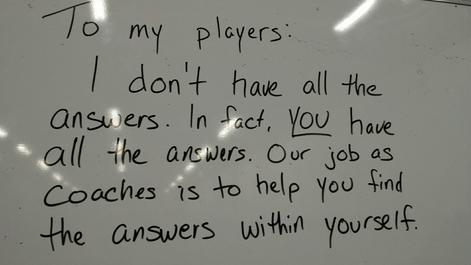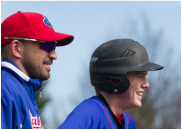As our fall season came to a close and players started to look deep into a long, snowy off-season I made a few general observations:
1. Players in 2016 have a greater sense of entitlement. They expect to be provided with certain opportunities.
When players feel entitled, they expect to be given certain opportunities without any further justification based on effort or performance. They are saying “you owe me” and therefore are not willing to invest.
COACHES: focus on developing active learners who are willing to invest more in their development than their coaches.
2. There is a general reduction in player accountability. There is a greater feeling that they are victims or someone else is at fault for their situation.
If players lack personal accountability they feel like they are a victim. They have a mindset of being acted upon. The reason they are the way they are is outside of their control and they are influenced by outside forces. When players accept responsibility then they regain a sense of control and can believe that their work ethic will make a difference. Accept responsibility for your mistakes and the situation you are in so you (and everyone around you) can move on and deal with present circumstances.
COACHES: provide a safe environment for athletes to admit mistakes and take responsibility.
3. Excuses are more common. Because they don’t feel personally accountable for their situation, excuses become an easy cop-out. I regularly see excuses being made for players by their parents and teammates and they are all readily accepted! Excuses will only keep you from dealing with the true issues. Make a commitment to stop wasting time on the excuses and spend that valuable energy moving closer to your goals.
COACHES: don’t allow players use any energy on factors that are outside of their control.
Take Control of Your Off-Season in 5 Easy Steps:
1. Define who you are accountable to. Your teammates? Your coaches? Yourself? Having accountability (whether formal or informal) to someone other than yourself will decrease the chances that you feel entitled or like a victim.
2. Get use to the using the pronoun “I”…and use it A LOT! Training in the off-season isn’t a “WE” thing. Getting into the weightroom and busting your tail isn’t a “YOU” thing. When you are giving credit, then you can use the plural, but don’t soften the sting of failure by saying “WE”. When you talk about responsibility, use “I”. Even if you are only 10% responsible, take 100% accountability for the 10% that was your fault.
COACHES: When developing your teams it is critical that players get comfortable taking responsibility for their portion of failure. It is up to you to create an environment where players feel safe identifying failures and this will lead to a culture where mistakes are acceptable and aggressiveness will be the result. For more information on playing to make plays and not simply avoiding errors click here.
3. Be specific about the decisions you made and the actions that you took that led to the results you achieved. It is easy to blame a bigger picture:
It was the group I was in...I am too busy...the coaches weren’t very good...
But what was it about you that led to coming up short? Was your time management good enough? Was your mental approach to training strong enough?
Coaches don’t have an issue with players who make mistakes as long as they take responsibility for what happened. Coaches understand that mistakes are a byproduct of progressive and aggressive play. If a player takes responsibility then a coach knows that the mistake is less likely to occur again. If a player makes an excuse then a coach has to assume the mistake will surface again.
4. Don’t wallow in remorse or self-pity when things go wrong. You can express regret, but learn and move on so you are not subject to the victim mindset again. When players feel sorry for themselves they are typically trying to make other people (coaches or teammates or fans) feel sorry for them in hopes that they will judge them less harshly.
COACHES: don’t allow players to engage in self-pity because this takes away a learning opportunity and only serves to deflect attention away from the true issue.
5. Take specific action to remedy the problem. Review what went well and what didn’t in detail and understand what specific actions will lead to a different result when the same situation arises in the future. I strongly suggest that athletes keep a daily journal of their training. This can provide enormous insight into what a player can do to adjust after a failure and what they were doing when these mistakes were not showing up in their game.
COACHES: it is not fair to expect perfection, but it should be understood by your players that you expect them to learn, grow, and adjust when they make mistakes.



 RSS Feed
RSS Feed